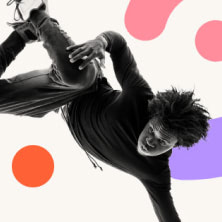
Ages 14+
- Bilingual
- ≈ 1 hour and 20 minutes · No intermission
Welcome cake and eggshells!
Five apartment neighbours are preparing a party to welcome a refugee family: cake, balloons, poems and good intentions. But chaos is waiting in the wings, and things are about to go terribly wrong. What is this elephant in the room?
With bracing humour, incisive language and an inclusive cast (including a charismatic actor with an intellectual disability), theatre company Joe Jack and John forces us to turn out the pockets of our identity to discover the prejudices and crumbs of intolerance embedded within. Joyful, caustic, stunning!
1 performance only!
Performed in French with some passages in English and QSL (Quebec Sign Language). Passages in French presented with English surtitles and passages in English presented with French surtitles.
There will be a post-show talk after the performance.
Press clipping excerpts
“The other one, the one who’s ... not like us. But who is ‘us’? Here, ‘us’ is four neighbours (three men, one with a slight disability, and one woman) who have decided to host Syrian refugees. While waiting for their ‘guests,’ they embody all the failings of the host society by expressing, sometimes to the point of discomfort, attitudes that are downright ‘racist.’ Catherine Bourgeois and her appealing company ask some pointed questions about our ability to truly accept difference, whatever it may be, without pretending or turning a blind eye. Dis merci is crafted with a lot of humour and intelligence. It’s worth the trip.”
La Presse, February 6, 2018, Mario Cloutier (Transl.)
“With its steady pace, clever mix of registers, singular combination of wackiness and social observation, not to mention the considerable vigour of the four performers, this is one of the company’s most successful shows, undeniably its most rich and balanced from a dramaturgical point of view.”
Le Devoir, February 6, 2018, Christian Saint-Pierre (Transl.)
“Catherine Bourgeois’ staging adds a touch of lightness to something that’s usually heavy, this thing like an elephant in the room that everyone pretends not to see. The colours, the moments of dance improvisation, the fragmented rhythm all contribute to the coherence of a concept we encounter every day, on every street corner, but that ends up becoming invisible. It’s not a combative play, but it achieves its purpose in its ability to remind us of what is around us, and it does it with humour.”
Voir, February 5, 2018, Rose Carine Henriquez (Transl.)
“What’s really noticeable is the omnipresence of humour, with actors who don’t hesitate to poke fun at themselves and make us laugh heartily with them. The show stays with you for several days, and some of its elements, which at first seem innocuous, gain significance on reflection.”
Jeu magazine, February 1, 2018, Aurélie Olivier (Transl.)
Theatre as team sport
A conversation with Catherine Bourgeois
What exactly is collaborative writing? What was the creative process behind the score of Dis merci?
Collaborative writing is like a game of ping pong. I begin by finding a topic that intrigues me, and I do some research. Then I bring together actors and actresses who might have something to say on the subject. In the case of Dis merci, each member of the cast has experience with issues of mobility, displacement, migration. Then, I prepare a rough outline of the structure based on suggestions for improvisation, a questionnaire or an image. The performers respond, we film, we discuss, then the playwright I’m working with gives us her input. The designers join the team, and their views come into play. The process continues, right up to the point of contact with the audience at one or two workshops where audience feedback is collected to fine-tune the script. We continue alternating between writing and rehearsal hall, until at last we have a script, choreography and a structure ... we’re ready for opening night!
- QSL interpreter Nico Bonin-Gauthier
- Lighting Audrey-Anne Bouchard
- Sound Éric Forget
- Costumes Amy Keith
- Dramaturgical consultant Sara Fauteux
- Stage manager and technical director Clémence Doray
- Featuring Lorie Ganley
- Surtitles translator Leanna Brodie
- Produced by Joe Jack et John







